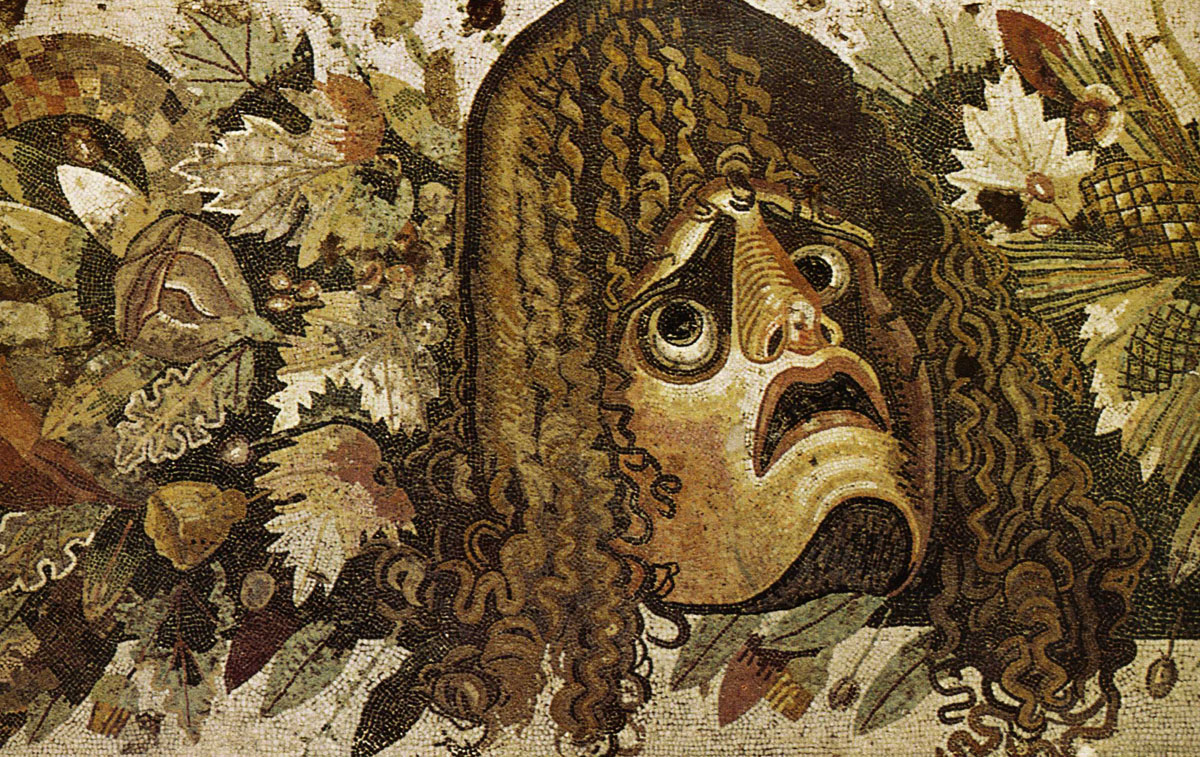
home
Greek Week Lecture Series |
Greek Week will feature a series of lectures about Greek drama and society from Tuesday, March 23 until Saturday, March 27. Specialists in ancient Greek history and culture from Gonzaga and universities across the Northwest will present their work to provide greater insight into Greek society of the 5th century BC and supply a context for Gonzaga's concurrent production of Aristophanes' Lysistrata. All lectures are free and open to the public.
|
| Tuesday, March 23 |
LECTURE: "The Lysistrata and its Context: Athens, Sparta and the Peloponnesian War" SPEAKER: Prof. Andrew Goldman (History Dept., Gonzaga University) TIME AND PLACE: 4:30 p.m., at Jepson Center 114, Wolff Auditorium ABSTRACT: The year in which Aristophanes’ Lysistrata was produced – 411 BC – fell within what was arguably the most tumultuous period in Athens’ long history. It was the time of the Peloponnesian War, a 27-year long conflict that its chief chronicler, Thucydides of Athens, justly believed to be “the greatest disturbance in the history of the Hellenes”. Between the war’s outbreak in 431 until its bloody conclusion in 404, tens of thousands of Greek soldiers and civilians would perish in battle at home or overseas, as victims of a devastating plague, or as inadvertent casualties of the war. While Sparta, Athens and their allies would see their fortunes constantly rise and fall during this extended conflict, they seemed unable or unwilling to halt a war that had devastating effects upon their city-states and civilization. This lecture will discuss the major causes and controversies surrounding the Peloponnesian War, providing a historical context for the issues of war and peace at the center of Aristophanes’ comedy.
|
| Wednesday, March 24 |
LECTURE:"The 'Desperate Housewives' of Aristophanes' Lysistrata: Women and Social Reality in Athens and Sparta " SPEAKER: Dr. Ardy Bass (Dept. of Religious Studies, Gonzaga University) TIME AND PLACE: 5 p.m., at Jepson Center 114, Wolff Auditorium ABSTRACT: A recent review of the television series Desperate Housewives declares that sexual content is the driving force for this series. Each dramatic episode is determined by the sex-ploits of a group of suburban women. Scholarly articles have been written on the show’s “subversive sexual politics.” To be sure, Desperate Housewives provides entertainment using satire, comedy and drama, but does it accurately reflect the social reality of the typical American housewife? In some ways – yes; yet the dramatic and comedic aspects exaggerate the lives of these suburban women. What does this have to do with the women in Arisophanes’ Lysistrata? Like the characters in Desperate Housewives, the women portrayed in Lysistrata use sexual innuendo and sexual content as a driving force in the plot. Does Aristophanes accurately reflect the social reality of women in Athens and Sparta? I will suggest that Lysistrata provides a window through which we can learn about attitudes toward women; however, Aristophanes presents an exaggerated view of the social status and role of women. Using the wool-working metaphor in Lysistrata, I will discuss the daily life of Greek and Spartan women like Lysistrata and Lampito. I will present, in image and text, what we can and cannot know about their lives, oikos and polis, including religion, work, family, education, and social status in the fifth-century BCE.
|
| Thursday, March 25 |
LECTURE:“Anatomy of an Ancient Theatre: The Theatre of Dionysus in Athens” SPEAKER: Prof. Thomas Hines (Theater Department, Whitman College) TIME AND PLACE: 4:30 p.m., Jepson Center 114, Wolff Auditorium ABSTRACT: The remains of a large stone theatre can be found on the southern slope of the Athenian Acropolis: broken rows of auditorium seating, a semi-circle of marble thrones facing an orchestra paved with tiles, a carved façade that once supported a stage, and the crumbling foundations of scene buildings and temples. These dilapidated and unassuming ruins are the surviving elements of the sacred precinct of Dionysus. What can be seen today is the final chapter in a history of innovations and renovations that dates back to Classical Greece and extends to the end of the Roman Empire. This was the theatre of Aeschylus, Sophocles, and Euripides; it staged the comedies of Aristophanes and Menander; it was the subject of the writers Aristotle, Pausanias, Plutarch, and Vitruvius. Established by Pericles in the 5th Century BCE, the theatre was renovated numerous times to reflect the performance needs of Classical, Hellenistic and Roman drama. We will take a virtual tour of this 2500 year-old site as it appears today, examine the extant remains, and discuss the evolution of Greek theatre architecture.
|
| Friday, March 26 |
LECTURE: "The Stagecraft and Performance of Lysistrata" SPEAKER: Prof. C. W. (Toph) Marshall ( Dept. of Classical, Near Eastern and Religious Studies, University of British Columbia) TIME AND PLACE: 4:30 p.m., Jepson Center 114, Wolff Auditorium ABSTRACT: Among the Aristophanic corpus, Lysistrata separates itself from the rest of Old Comedy in a number of ways. Apparently the first comedy to present citizen women speaking on stage, the play's stagecraft decisions mark it as distinct. This informal talk will examine the play in its original performance context, paying particular attention to the use of masks, doubling, costume, stage space, extras, chorus, and props. The play will be examined in terms of its initial performance at the Lenaia in 411, and evidence will be presented to suggest the play was re-written in the fourth century for performance outside of Athens. Understanding ancient production decisions enables a modern production to make informed production choices so as best to convey an understanding of the vibrant humor and dynamism of the original, as adapted to a modern theatre space.
|
| Saturday, March 27 |
There will be TWO lectures held on Saturday, March 27, at the Jundt Auditorium. LECTURE 1 LECTURE:“Allowed Fools? Four Models of the Role of Comedy in the Politics of Democratic Athens” SPEAKER: Prof. Nigel Nicholson (Classics Dept., Reed College) TIME AND PLACE: 12 noon, Jundt Art Center 110, Jundt Auditorium ABSTRACT: What is the role of laughter in politics? Why would a democratic city sponsor a politically involved comedy that made its audience laugh at their own customs, policies and leaders? What was to be gained by such irreverence, or how did it help the city run itself? This lecture will examine four ways to understand the role of comedy in political processes of fifth-century Athens, and in politics more generally: first, that comedy acted as a kind of spoonful of sugar to help the medicine of politics easier to stomach; second, that comedy offered a carnival world of topsy-turvy rules and regulations where the mass of the people were freed from the tyranny of the elite and of their high culture; third, that, by contrast, comedy was a form of political manipulation of the majority that offered them only a semblance of freedom in order to better control any destructive or rebellious impulses; and, fourth, that comedy continued the city’s political debates, but did so under rather different rules of behavior, and appealing to different bodily organs than the brain – engaging what Aristophanes calls in his Clouds a “bowel-wisdom.” All four are plausible models for the operation of laughter within a public sphere, but not all are equally appropriate to ancient Athens. Focusing on Aristophanes’ Lysistrata, this lecture will argue that one model, the fourth, offers the most fruitful and appropriate way to approach Athenian Comedy. LECTURE 2 LECTURE: "In a Dream of Passion: The Classical Greek Theater Festival" SPEAKER: Prof. James Svendsen (Dept. of Languages and Literature, University of Utah) TIME AND PLACE: 4 p.m. , Jundt Art Center 110, Jundt Auditorium ABSTRACT: The Classical Greek Theatre Festival (CGTF) is an annual theatrical event created to introduce and sustain the appreciation of ancient Greek theatre throughout communities and campuses in various southwestern and western states. CGTF is committed to the idea that Greek drama, like Shakespearean drama, has much to offer contemporary audiences. The festival, now in its fortieth season, began in 1971 under the leadership of Dr. Keith Engar, past chair of the University of Utah Department of Theatre, and Dr. Jim Svendsen, who has served to the present as producer and dramaturge. The Classical Greek Theatre Festival was so named to reflect a multi-dimensional event that includes not just the theatrical performance but also a coordinated outreach program with educational components. These include lectures, post-play discussions, exhibits, symposia, films, and a study guide distributed widely to the general public and to high school and college students. With a professional director, professional designers, composer and choreographer and actors from the U of Utah’s acclaimed Actor Training Program, CGTF has grown in terms of audience size (with outside performances reaching 1,000) and has established a track record for excellence, receiving critical recognition and awards. In 1999, for example, CGTF’s production of Libation Bearers won a regional award fro Best Ensemble from the Kennedy Center/American College Theatre Festival. CGTF is unique in its attempt to bring ancient Greek theatre to a broad American audience through modern American translations, original music, song and dance and an utterly entertaining theatricality.
|

